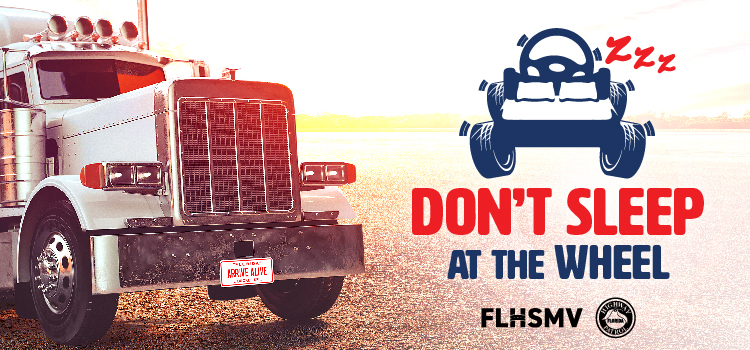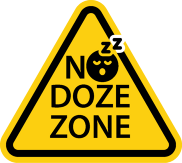Don’t be asleep at the Wheel, FLHSMV Raises Awareness of the Dangers of Driving Drowsy

~Studies Show effects of exhaustion comparable to effects of impairment~
TALLAHASSEE, FLA.- Today, the Florida Department of Highway Safety and Motor Vehicles (FLHSMV) launched its annual Drowsy Driving Prevention campaign. While the campaign spans a month, the first week, September 1-7, is dedicated to the memory of Ronshay Dugans, who in 2008 was killed while on a school bus when a drowsy driver hit it.
“When you get behind the wheel, certain necessary things need to operate for your car to start; the same goes for you to safely control it as the driver,” said FLHSMV Executive Director Dave Kerner. “It is important to know the signs of fatigue and how it can impact your driving. If you are tired, pull over and rest. Do not risk your life or the life of others on the road by continuing to drive while drowsy.”
“Always plan for a fresh start before driving. Drowsy driving can be as deadly as driving impaired,” said Gary Howze, Colonel of Florida Highway Patrol. “It’s important to remember to take a break on long trips, pull into a rest area or other safe place, or change drivers when you feel fatigued.”
“Driving with a clear mind and rested body isn’t just good personal practice; it’s a pledge we make to our fellow Floridians every time we take the wheel,” said FPCA President and Clermont Police Department Chief Charles “Chuck” Broadway. “This September let’s take a moment to actively choose to safeguard ourselves and our neighbors by recognizing the signs of drowsy driving and pulling over when needed. Join us in driving responsibly and making our highways a safer place for all. Your decision today could be why someone returns safely to their family tonight.”
“The National Safety Council reports that each year, drowsy driving accounts for about 100,000 crashes, 71,000 injuries, and 1,550 fatalities,” said FSA President and Nassau County Sheriff Bill Leeper. “The Sheriffs of Florida want to remind all motorists to get adequate sleep, avoid alcohol as well as medications that may make you sleepy before driving, and pull over if you notice you’re becoming drowsy. Please do everything you can to ensure you, your passengers, and others on our roadways arrive alive.”
“According to research from the AAA Foundation for Traffic Safety, it is estimated that 6% to 11% of all police-reported motor-vehicle crashes and 16% to 21% of fatal crashes likely involve drowsy driving, said Michele Harris, Florida Public Affairs Director, AAA – The Auto Club Group. “Take steps to stay alert because it could save your life as well as the lives of innocent motorists.”
“Drivers shouldn’t rely on ‘alertness tricks’ to stay awake while driving,” said President and CEO of Florida Trucking Association Alix Miller. “The safest and most effective way to combat drowsiness is to find a safe place to park and take a short nap.”
 Throughout September, FLHSMV will focus on educating drivers to recognize the signs of exhaustion, how to prevent drowsiness when planning to be behind the wheel, and what to do if they are tired or displaying signs of fatigue while driving.
Throughout September, FLHSMV will focus on educating drivers to recognize the signs of exhaustion, how to prevent drowsiness when planning to be behind the wheel, and what to do if they are tired or displaying signs of fatigue while driving.
The National Highway Traffic Safety Administration (NHTSA) categorizes drowsy driving as risky driving behavior, in the same way, that driving while drunk, drug-impaired, distracted, without a seatbelt, or at excessive speeds is risky. Including drowsy driving in the risky driving category makes awareness a critical aspect of occurring.
Recognize the signs of Drowsy Driving:
- Yawning or frequent blinking.
- Difficulty remembering the past few miles driven.
- Missing your exit.
- Drifting from your lane.
- Hitting a rumble strip on the side of the road.
- Nodding off or micro sleeping.
- Following other cars too closely.
- Difficulty maintaining proper speed.
If you experience these warning signs, PULL OVER TO REST OR CHANGE DRIVERS. Turning up the radio or opening the window are ineffective ways to keep you alert.
Who is most at risk to Drive Drowsy?
- Drivers who do not get enough sleep.
- Shift workers (work the night shift or long shifts).
- Teenagers who have less driving experience and high rates of sleep insufficiency.
- Drivers who use medications that make them tired.
- Those who have consumed alcohol.
- Commercial drivers, bus drivers, or those who drive a significant number of miles at night.
- Drivers on the road between midnight and 6 a.m. or in the later afternoon.
- People with severe sleep problems, including insomnia or other sleep disorders.
To avoid the risk of drowsy driving, you should:
- Get enough sleep before you get behind the wheel; it is the best way to ensure you can maintain alertness while driving.
- Read the warning label on your medications, and do not drive after taking medications that cause drowsiness.
- On long trips, take a break every 100 miles or two hours. Allow plenty of time to get to your destination.
- Use the “buddy system” so you can change drivers when needed.
- Avoid driving at times when you would usually be asleep. If you have difficulty focusing, frequent blinking, or heavy eyelids, pull over in a safe place to rest before continuing to drive.
- The Florida Department of Transportation maintains multiple rest areas, service plazas, truck comfort stations, and welcome centers throughout Florida. There are great places to stop and take a break. For more information, visit their webpage here.
- Be wary of “tricks” to stay awake: Some people try fiddling with their windows, air conditioning, or radio, but this can draw your attention away from the road. Instead of using these tricks, stopping and letting your body get the rest it needs is better.
Visit FLHSMV’s website, flhsmv.gov/drowsy, for more information and shareable resources to help spread the word about drowsy driving prevention.
###
The Florida Department of Highway Safety and Motor Vehicles (FLHSMV) provides highway safety and security through excellence in service, education, and enforcement. Learn more on our website.
The Florida Highway Patrol strives to achieve core values of courtesy, service, and protection. It is FHP’s job to help ensure the safety and welfare of millions of Florida’s residents and visitors every day.
To learn more about FHP or how to become one of Florida’s Finest, visit BeATrooper.com.

Dave Kerner, Executive Director